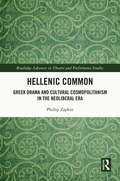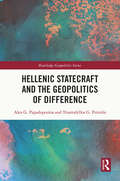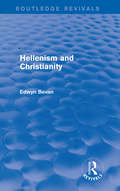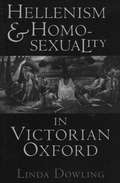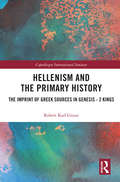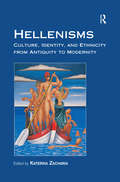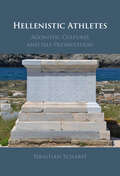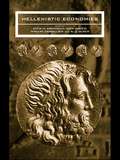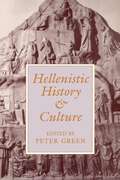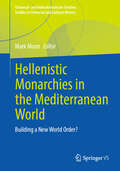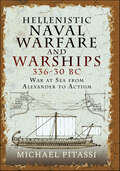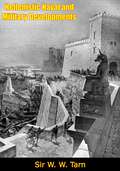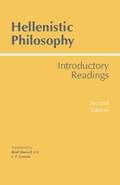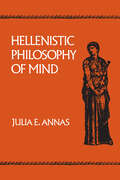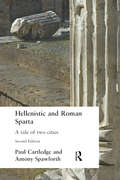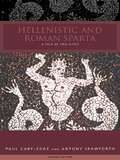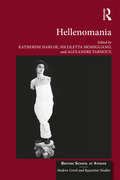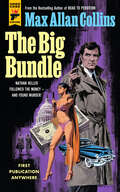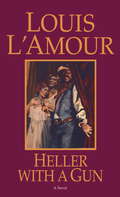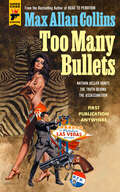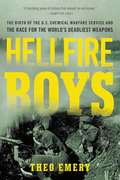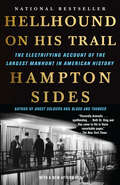- Table View
- List View
Hellenic Common: Greek Drama and Cultural Cosmopolitanism in the Neoliberal Era (Routledge Advances in Theatre & Performance Studies)
by Philip ZapkinHellenic Common argues that theatrical adaptations of Greek tragedy exemplify the functioning of a cosmopolitan cultural commonwealth. Analyzing plays by Femi Osofisan, Moira Buffini, Marina Carr, Colin Teevan, and Yael Farber, this book shows how contemporary adapters draw tragic and mythic material from a cultural common and remake those stories for modern audiences. Phillip Zapkin theorizes a political economy of adaptation, combining both a formal reading of adaptation as an aesthetic practice and a political reading of adaptation as a form of resistance. Drawing an ethical centre from Kwame Anthony Appiah’s work on cosmopolitanism and Michael Hardt and Antonio Negri’s theory of the common, Hellenic Common argues that Attic tragedy forms a cultural commonwealth from which dramatists the world over can rework, reimagine, and restage materials to envision aspirational new worlds through the arts. This study will be of great interest to students and scholars of drama, adaptation studies, literature, and neoliberalism.
Hellenic Statecraft and the Geopolitics of Difference (Routledge Geopolitics Series)
by Alex G. Papadopoulos Triantafyllos G. PetridisThis book explores competing definitions of Hellenism in the making of the Greek state by drawing on critical historical and geopolitical perspectives and their intersection with difference and exclusion. It examines Greece’s central role in shaping the state system, regional security, and nationalisms of the Balkans, the Black Sea, and the Eastern Mediterranean regions. Understanding the Greek State's social constitution helps learn about the past and present intentions and strategies as well as local, national, and European notions of security and identity. The book looks at the relation of subaltern communities to state power and the state’s ability and willingness to negotiate difference. It also explores how the State’s identity politics shaped regional geopolitics in the past two centuries. Chapters present case studies that shed light on the Hellenization of Jewish Thessaloniki, the Treaty of Lausanne’s making of Western Thrace’s Muslim minority, the role and modes of settlement, urbanization, and ‘bordering-as-statecraft’ in Eastern Macedonia and Western Thrace, and the politics of erecting the Athens Mosque, the first officially-licensed mosque outside Western Thrace since Greek Independence. With examples from fieldwork in Greek cities and borderlands, this book offers a wealth of primary research from geographers and historians on the modern history of Greek statehood. It will be of key interest to scholars of political geography, international relations, and European history.
Hellenism and Christianity (Routledge Revivals)
by Edwyn BevanFirst published in 1921, this title examines the relationship between what the author labels the ‘rationalist’ element in Western culture on the one hand, derived from the ancient Greeks, and Christianity, on the other. Bevan contends that these two traditions are distinct, but not mutually exclusive, and that to understand fully their mutuality and reciprocity it is necessary to examine the distinct history of both: their individual provenances, their fusion and interpenetration, and also, their future together. The first chapter attempts to indicate the significance of Hellenic culture in its relation to Eastern civilisation. The extinction of Paganism at the time of Augustine is examined, as is a selection of moral issues associated with the Christian life, as that is interpreted by the author. Finally, the notion of ‘progress’ is investigated with specific reference to the position of Christianity in the modern world.
Hellenism and Homosexuality in Victorian Oxford
by Linda DowlingIn April 1895, Oscar Wilde stood in the prisoner's dock of the Old Bailey, charged with "acts of gross indecency with another male person. These filthy practices, the prosecutor declared, posed a deadly threat to English society, "a sore which cannot fail in time to corrupt and taint it all." Wilde responded with a speech of legendary eloquence, defending love between men as a love "such as Plato made the very basis of his philosophy, and such as you find in the sonnets of Michelangelo and Shakespeare." Electrified, the spectators in the courtroom burst into applause.Although Wilde was ultimately imprisoned, the courtroom response to his speech signaled a revolutionary moment-the emergence into the public sphere of a kind of love that had always been proscribed in English culture. In this luminous work of intellectual history, Linda Dowling offers the first detailed account of Oxford Hellenism, the Victorian philosophical and literary movement that made possible Wilde's brief triumph and anticipated the modern possibility of homosexuality as a positive social identity.A homosocial culture and a language of moral legitimacy for homosexuality emerged, Dowling argues, as unforeseen consequences of Oxford University reform. Through their search in Plato and Greek literature for a transcendental value that might substitute for a lost Christian theology, such liberal reformers as Benjamin Jowett unintentionally created a cultural context in which male love-the "spiritual procreancy" celebrated in Plato's Symposium-might be both experienced and justified in ideal terms. Dowling traces the institutional career of Hellenism from its roots in Oxford reform through its blossoming in an approach to Greek studies that came to operate as a code for homosexuality. Recreating the incidents, controversies, and scandals that heralded the growth of Hellenism, Dowling provides a new cultural and theoretical context within which to read writers as diverse as Wilde, Jowett, John Addington Symonds, Walter Pater, Lord Alfred Douglas, Robert Buchanan, and W. H. Mallock.
Hellenism and the Primary History: The Imprint of Greek Sources in Genesis - 2 Kings
by Robert Karl GnuseThis collection of essays seeks to demonstrate that many biblical authors deliberately used Classical and Hellenistic Greek texts for inspiration when crafting many of the narratives in the Primary History. Through detailed analysis of the text, Gnuse contends that there are numerous examples of clear influence from late classical and Hellenistic literature. Deconstructing the biblical and Greek works in parallel, he argues that there are too many similarities in basic theme, meaning, and detail, for them to be accounted for by coincidence or shared ancient tropes. Using this evidence, he suggests that although much of the text may originate from the Persian period, large parts of its final form likely date from the Hellenistic era. With the help of an original introduction and final chapter, Gnuse pulls his essays together into a coherent collection for the first time. The resultant volume offers a valuable resource for anyone working on the dating of the Hebrew Bible, as well as those working on Hellenism in the ancient Levant more broadly.
Hellenisms: Culture, Identity, and Ethnicity from Antiquity to Modernity
by Katerina ZachariaThis volume casts a fresh look at the multifaceted expressions of diachronic Hellenisms. A distinguished group of historians, classicists, anthropologists, ethnographers, cultural studies, and comparative literature scholars contribute essays exploring the variegated mantles of Greek ethnicity, and the legacy of Greek culture for the ancient and modern Greeks in the homeland and the diaspora, as well as for the ancient Romans and the modern Europeans. Given the scarcity of books on diachronic Hellenism in the English-speaking world, the publication of this volume represents nothing less than a breakthrough. The book provides a valuable forum to reflect on Hellenism, and is certain to generate further academic interest in the topic. The specific contribution of this volume lies in the fact that it problematizes the fluidity of Hellenism and offers a much-needed public dialogue between disparate viewpoints, in the process making a case for the existence and viability of such a polyphony. The chapters in this volume offer a reorientation of the study of Hellenism away from a binary perception to approaches giving priority to fluidity, hybridity, and multi-vocality. The volume also deals with issues of recycling tradition, cultural category, and perceptions of ethnicity. Topics explored range from European Philhellenism to Hellenic Hellenism, from the Athens 2004 Olympics to Greek cinema, from a psychoanalytical engagement with anthropological material to a subtle ethnographic analysis of Greek-American women's material culture. The readership envisaged is both academic and non-specialist; with this aim in mind, all quotations from ancient and modern sources in foreign languages have been translated into English.
Hellenistic Athletes: Agonistic Cultures and Self-Presentation
by Sebastian ScharffThis is a study of Hellenistic athletics from the perspective of the victors. By analyzing agonistic epigrams as poetry on commission, it investigates how successful athletes and horse owners and their sponsors wanted their victories to be understood. Based on the identification of recurring motifs that exceed the conventions of the genre, a multiplicity of agonistic cultures is detected on three different levels – those of the polis, the region and the empire. Kings and queens used athletics in order to legitimate their rule, cities tried to compensate for military defeats by agonistic successes, and victorious aristocrats created virtual halls of fame to emphasize their common regional identity. Without a doubt, athletic victories represented far more than just leisure activities of Hellenistic noblemen. They clearly mattered in terms of politics and social status.
Hellenistic Economies
by John Davies Vincent Gabrielsen Zofia H. Archibald G. J. OliverThe economies of classical and Mediterranean antiquity are currently a battleground. Some scholars see them as lively and progressive, even proto-capitalist: others see them as static, embedded in social action and status relationships.Focusing on the central period of the Mediterranean 330-30 BC, this book contributes substantially to the debate, by juxtaposing general questions of theory and model-building with case-studies which examine specific areas and kinds of evidence.It breaks new ground by distilling and presenting new and newly-reinterpreted evidence for the Hellenistic era, by opening the debate on how we should replace Rostovtzeff's classic view of this period, and by offering a compelling new set of interpretative ideas to the debate on the ancient economy.
Hellenistic History and Culture (Hellenistic Culture and Society #9)
by Peter GreenIn a 1988 conference, American and British scholars unexpectedly discovered that their ideas were converging in ways that formed a new picture of the variegated Hellenistic mosaic. That picture emerges in these essays and eloquently displays the breadth of modern interest in the Hellenistic Age.A distrust of all ideologies has altered old views of ancient political structures, and feminism has also changed earlier assessments. The current emphasis on multiculturalism has consciously deemphasized the Western, Greco-Roman tradition, and Nubians, Bactrians, and other subject peoples of the time are receiving attention in their own right, not just as recipients of Greco-Roman culture.History, like Herakleitos' river, never stands still. These essays share a collective sense of discovery and a sparking of new ideas—they are a welcome beginning to the reexploration of a fascinatingly complex age.
Hellenistic Monarchies in the Mediterranean World: Building a New World Order? (Universal- und kulturhistorische Studien. Studies in Universal and Cultural History)
by Mark MunnThe contributions to this volume represent a range of case studies that provide perspectives on the question of how deeply Hellenic influence penetrated into the lives of the subjects of the Hellenistic monarchies. Greek became the language of international discourse of the ruling elites in the kingdoms formed after the conquests of Alexander. But to what extent were the institutions and practices of these monarchies shaped by ideologies brought by Greek-speaking rulers? To what extent did the customs of the complex cultures they ruled over shape the practices of the ruling elites, conserving ancient institutions in traditional ways?
Hellenistic Naval Warfare and Warships 336–30 BC: War at Sea from Alexander to Actium
by Michael Paul PitassiThe Hellenistic period, from Alexander the Great to the Battle of Actium, was a time of great technological change and innovation in naval design. There was a naval arms race between the Successor States that culminated in a plethora of ship types and the largest oared vessels ever built. Michael Pitassi gathers all the available evidence and comparative data to reconstruct the various classes of warship. Each is illustrated with clear diagrams and scale models, with particular attention paid to the arrangement of oars and rowers, the subject of much ongoing debate. He narrates the key naval battles of the period, huge affairs involving hundreds of ships, describing the forces engaged and the tactics employed. Strategic factors such as the location of port facilities, the supply of timber and maritime trade are also considered.
Hellenistic Naval and Military Developments
by Sir W. W. TarnFirst published in 1930, this is a collection of essays by the noted classical scholar W. W. Tarn, originally delivered as Lees Knowles Lectures in Military History at Trinity College, Cambridge. Tarn draws on a range of sources to trace the history and development of warfare in the Hellenistic period, with particular emphasis on military strategy under Alexander the Great. The first lecture outlines the role of infantry, analysing the weaponry used in various battles. In the second lecture, Tarn examines the development of cavalry, its history in Macedonia, Thessaly and Iran, and its use of elephants and camels. The final lecture explores improvements in siege and naval methods, with particular attention to advancements in artillery. Providing valuable insight into a period of extensive military innovation, this book gives an overview of the military and naval arts and sciences of the Hellenistic era.
Hellenistic Philosophy
by Brad Inwood Lloyd P. GersonThis new edition of Hellenistic Philosophy--including nearly 100 pages of additional materia--offers the first English translation of the account of Stoic ethics by Arius Didymus, substantial new sources on Epicureanism, Stoicism, and Scepticism, expanded representation of Plutarch and Cicero, and a fuller presentation of papyrological evidence. Inwood and Gerson maintain the standard of consistency and accuracy that distinguished their translations in the first edition, while regrouping some material into larger, more thematically connected passages.
Hellenistic Philosophy of Mind (Hellenistic Culture and Society #8)
by Julia E. AnnasHellenistic Philosophy of Mind is an elegant survey of Stoic and Epicurean ideas about the soul—an introduction to two ancient schools whose belief in the soul's physicality offer compelling parallels to modern approaches in the philosophy of mind. Annas incorporates recent thinking on Hellenistic philosophy of mind so lucidly and authoritatively that specialists and nonspecialists alike will find her book rewarding.In part, the Hellenistic epoch was a "scientific" period that broke with tradition in ways that have an affinity with the modern shift from the seventeenth and eighteenth centuries to the present day. Hellenistic philosophy of the soul, Annas argues, is in fact a philosophy of mind, especially in the treatment of such topics as perception, thought, and action.
Hellenistic and Roman Sparta
by Paul Cartledge Antony SpawforthIn this new edition, Paul Cartledge and Antony Spawforth have taken account of recent finds and scholarship to revise and update their authoritative overview of later Spartan history, and of the social, political, economic and cultural changes in the Spartan community.This original and compelling account is especially significant in challenging the conventional misperception of Spartan 'decline' after the loss of her status as a great power on the battlefield in 371 BC. The book's focus on a frequently overlooked period makes it important not only for those interested specifically in Sparta, but also for all those concerned with Hellenistic Greece, and with the life of Greece and other Greek-speaking provinces under non-Roman rule.
Hellenistic and Roman Sparta: A Regional History 1300-362 BC
by Paul CartledgeIn this new edition, Paul Cartledge and Antony Spawforth have taken account of recent finds and scholarship to revise and update their authoritative overview of later Spartan history, and of the social, political, economic and cultural changes in the Spartan community.This original and compelling account is especially significant in challenging the conventional misperception of Spartan 'decline' after the loss of her status as a great power on the battlefield in 371 BC. The book's focus on a frequently overlooked period makes it important not only for those interested specifically in Sparta, but also for all those concerned with Hellenistic Greece, and with the life of Greece and other Greek-speaking provinces under non-Roman rule.
Hellenomania (British School at Athens - Modern Greek and Byzantine Studies #5)
by Katherine Harloe Alexandre Farnoux Nicoletta MomiglianoHellenomania, the second volume in the MANIA series, presents a wide-ranging, multi-disciplinary exploration of the modern reception of ancient Greek material culture in cultural practices ranging from literature to architecture, stage and costume design, painting, sculpture, cinema, and the performing arts. It examines both canonical and less familiar responses to both real and imagined Greek antiquities from the seventeenth century to the present, across various national contexts. Encompassing examples from Inigo Jones to the contemporary art exhibition documenta 14, and from Thessaloniki and Delphi to Nashville, the contributions examine attempted reconstructions of an ‘authentic’ ancient Greece alongside imaginative and utopian efforts to revive the Greek spirit using modern technologies, new media, and experimental practices of the body. Also explored are the political resonances of Hellenomaniac fascinations, and tensions within them between the ideal and the real, the past, present, and future. Part I examines the sources and derivations of Hellenomania from the Baroque and pre-Romantic periods to the early twentieth century. While covering more canonical material than the following sections, it also casts spotlights on less familiar figures and sets the scene for the illustrations of successive waves of Hellenomania explored in subsequent chapters. Part II focuses on responses, uses, and appropriations of ancient Greek material culture in the built environment—mostly architecture—but also extends to painting and even gymnastics; it examines in particular how a certain idealisation of ancient Greek architecture affected its modern applications. Part III explores challenges to the idealisation of ancient Greece, through the transformative power of colour, movement, and of reliving the past in the present human body, especially female. Part IV looks at how the fascination with the material culture of ancient Greece can move beyond the obsession with Greece and Greekness.
Heller - The Big Bundle
by Max Allan CollinsTrue Crime detective Nathan Heller returns in a brand new case that connects a millionaire&’s kidnapped child to Robert F. Kennedy&’s campaign to bring down union boss Jimmy Hoffa.Nathan Heller, star of MWA Grandmaster Max Allan Collins&’ most acclaimed series of novels (more than 1 million copies sold to date!), comes to Hard Case Crime for the first time in an all-new thriller drawn from the pages of history. A millionaire&’s son is kidnapped and private eye Heller is called in to help. But when half of the record $600,000 ransom goes missing, Heller must wade through a morass of deception and depravity to blow the lid off a notorious crime whose consequences reach into the corridors of power in Washington D.C., where Bobby Kennedy works tirelessly to take down crooked union boss Jimmy Hoffa…
Heller with a Gun
by Louis L'AmourTom Healy was in trouble. His theatrical troupe needed to get to Alder Gulch, Montana, and the weather was turning. Andy Barker promised Tom he could get them there safely, but Tom was reluctant to trust him: he had the lives of three actresses to consider, and his personal feelings for Janice further heightened his concern. Then King Mabry showed up. Although Tom didn't like the way he looked at Janice, he could see that Mabry made Barker uneasy. So Tom invited Mabry to join them. Tom was right to be worried, because Barker had a plan. He knew that the wagons carried something more than actors and scenery. He and his men were going to steal it any way they could. And that included murder.From the Paperback edition.
Heller with a Gun
by Louis L'AmourTom Healy was in trouble. His theatrical troupe needed to get to Alder Gulch, Montana, and the weather was turning. Andy Barker promised Tom he could get them there safely, but Tom was reluctant to trust him: he had the lives of three actresses to consider, and his personal feelings for Janice further heightened his concern. Then King Mabry showed up. Although Tom didn't like the way he looked at Janice, he could see that Mabry made Barker uneasy. So Tom invited Mabry to join them. Tom was right to be worried, because Barker had a plan. He knew that the wagons carried something more than actors and scenery. He and his men were going to steal it any way they could. And that included murder.From the Paperback edition.
Heller: Too Many Bullets
by Max Allan CollinsAcclaimed &“True Crime&” detective Nathan Heller, whose cases have sold more than 1 million copies, returns to uncover the secrets behind Robert F. Kennedy&’s 1968 assassination in this brand-new novel from bestselling ROAD TO PERDITION author Max Allan Collins.In 1968, Nate Heller is there when Robert Kennedy is shot at the Ambassador Hotel. Heller takes it upon himself to investigate the murder when a friend of his and Bobby&’s raises doubts about the LAPD&’s investigation. Heller strongly suspects the involvement of Jimmy Hoffa (currently imprisoned), but Hoffa seems to be in the clear as the private eye looks into the possible presence of CIA enemies of RFK&’s on the murder night, the apparent manipulation of Sirhan Sirhan into a Manchurian Candidate-style assassin, and a probable second shooter.
Helleville
by Hayden ThorneAll fifteen-year-old Noah Hipwell wants is to go through high school in peace. Yet he finds himself suspended after a bully pushes him too far, and Noah’s forced to defend himself. His mother, fed up with the school’s indifference to his plight, pulls him out completely and leaves Noah uncertain of his future while they look for a good and safe school for him.All Dorothy “Dot” Hipwell wants is to go through single motherhood in peace. Yet she and her son are harassed by weekly phone calls from her evangelical family hell-bent on guilt-tripping them both back into the fold. Then Noah’s grandparents ask strange questions about their old van after dropping cryptic references to a group called The Soul Warriors. Fed up, Dot takes Noah away for a much-needed getaway, only to find themselves suddenly transported to an alternate world, where a town called Helleville awaits them and all other condemned souls.Along with warm-blooded, living human beings, the Hipwells rub shoulders with zombies, vampires, house ghosts, and occasional “green vomit piles” while picking up the pieces and sorting out what could very well be an eternity in a bizarre, fanciful, and humorous world of ghouls and banned books.When residents suddenly disappear one by one with no trace and for no logical reason, however, doubts being “housed” in an alternate world for their sins are raised, and time suddenly becomes of the essence as Noah and the rest of Helleville’s condemned race to find answers to what’s quickly turning into a dangerous puzzle.
Hellfire Boys: The Birth of the U.S. Chemical Warfare Service and the Race for the World¿s Deadliest Weapons
by Theo EmeryAn explosive look into the dawn of chemical warfare during World War I "A terrifying piece of history that almost no one knows." - Hampton Sides In 1915, when German forces executed the first successful gas attack of World War I, the world watched in horror as the boundaries of warfare were forever changed. Cries of barbarianism rang throughout Europe, yet Allied nations immediately jumped into the fray, kickstarting an arms race that would redefine a war already steeped in unimaginable horror. Largely forgotten in the confines of history, the development of the U.S. Chemical Warfare Service in 1917 left an indelible imprint on World War I. This small yet powerful division, along with the burgeoning Bureau of Mines, assembled research and military unites devoted solely to chemical weaponry, outfitting regiments with hastily made gas-resistant uniforms and recruiting scientists and engineers from around the world into the fight. As the threat of new gases and more destructive chemicals grew stronger, the chemists' secret work in the laboratories transformed into an explosive fusion of steel, science, and gas on the battlefield. Drawing from years of research, Theo Emery brilliantly shows how World War I quickly spiraled into a chemists' war, one led by the companies of young American engineers-turned-soldiers who would soon become known as the "Hellfire Boys." As gas attacks began to mark the heaviest and most devastating battles, these brave and brilliant men were on the front lines, racing against the clock-and the Germans-to protect, develop, and unleash the latest weapons of mass destruction.
Hellhound On His Trail: The Electrifying Account of the Largest Manhunt In American History
by Hampton SidesNATIONAL BESTSELLER • On April 4, 1968, James Earl Ray shot Martin Luther King Jr. at the Lorraine Motel. The nation was shocked, enraged, and saddened. As chaos erupted across the country and mourners gathered at King's funeral, investigators launched a sixty-five day search for King&’s assassin that would lead them across two continents—from the author of Blood and Thunder and Ghost Soldiers.With a blistering, cross-cutting narrative that draws on a wealth of dramatic unpublished documents, Hampton Sides, bestselling author of Ghost Soldiers, delivers a non-fiction thriller in the tradition of William Manchester's The Death of a President and Truman Capote's In Cold Blood. With Hellhound On His Trail, Sides shines a light on the largest manhunt in American history and brings it to life for all to see.With a New Afterword
